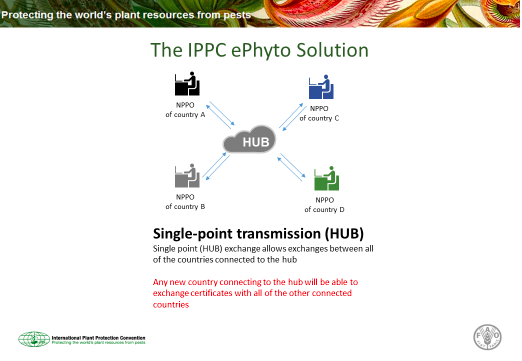A. General Information
IPPC ePhyto Solution
B. Lessons Learned

Registered - 15
Testing - 29
Live - 65
New to Hub - 6 Algeria, Belize, Malawi, Nauru, Solomon Islands, Switzerland
To provide developing countries with a simple generic system for the production, sending and receipt of electronic phytosanitary certificates and to establish a harmonized exchange tool to facilitate the exchange of electronic certificates as an alternative to the current practice of exchanging paper certificates. The establishment of these tools will improve the security of official communications between countries and the trade flows. It will also eliminate the cost and complexity of countries developing individual systems for electronic data exchange and the necessity to negotiate exchange protocols on a country by country basis.
To face the challenges deriving from the cross-border trade complexities in the area of plant pest control which may threaten not only supply chain safety, transiting countries, as well as the flora of vast areas in importing countries. The Project provides all interested IPPC Contracting Parties a facilitated and secure exchange of phytosanitary certificate information in electronic/digital form (the ePhyto).
Exchange of electronic Phytosanitary Certificates
- Use of the Hub is voluntary
- The Hub is a single, multilateral system
- The Hub is available 24/7 (secure and monitored)
- No information (messages, transactions) should be lost
- There is a single exchange protocol
- The IPPC determines the version of UN/CEFACT schema
- Participating countries will require a National System to exchange ePhyto through the Hub or use the Generic system
Source: https://www.ephytoexchange.org/
Phytosanitary Certificates
Please refer to this link for details: https://www.ephytoexchange.org/doc/HUB_Web_Service_API_EN.pdf
Lack of resources and challenges to initiate the Project due to delays on the part of some international and national stakeholders. Nothing else out of the ordinary for a technical project of this type.
- time savings in processing goods at the border,
- a reduction in fraudulent certificates,
- elimination of costs for courier services (based on case studies )
- Reduce possibilities for fraudulent documentation
- Reduce multiple data entry and validation functions by NPPO staff
- Improve security in the transmission of certificate documentation
- Improve planning for the arrival and clearance of plants and plant products at customs
- Reduce delays in receiving replacement phytosanitary certificates
- Maximize the investment by building on existing initiatives
- Reduce ongoing and costly bilateral arrangements
- Ability to link into the World Customs Organization “Single Window Environment” initiative, harmonize codes and processes.
Some IPPC Contracting parties as well as the Global Alliance for Trade Facilitation and the World Bank provided both technical and financial assistance.
The project is global and focused on phytosanitary certificates only at this time. IPPC has invited the other two SPS “sisters”, as well as any other organization interested in electronically exchanging documents currently in paper form to evaluate the opportunity of using the developed centralized HUB and available tools.


